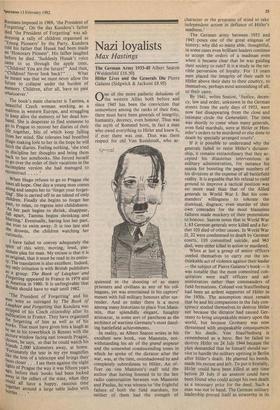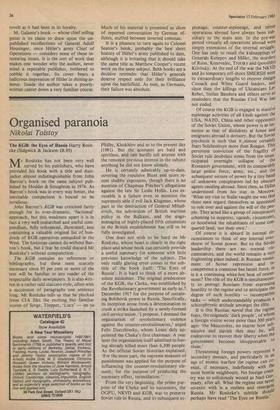Nazi loyalists
Max Hastings
One of the more pathetic delusions of the western Allies both before and since 1945 has been the conviction that somewhere among the ranks of their foes, there must have been generals of integrity, humanity, decency, even honour. Thus was the myth of Rommel born, in fact a man who owed everything to Hitler and knew it, if ever there was one. Thus was there respect for old Von Rundstedt, who ac-
quiesced in the shooting of as many prisoners and civilians as any of his col- leagues, yet was entertained in his captors' messes with full military honours after sur- render. And so today there is a move among many historians to place Von Mans- tein, that splendidly elegant, haughty aristocrat, in some sort of pantheon as the architect of wartime Germany's most dazzl- ing battlefield achievements.
In reality, as Albert Seaton writes in his excellent new book, von Manstein, not- withstanding his air of the grand seigneur and the somewhat condescending tones in which he spoke of the dictator after the war, was, at the time, overshadowed by and completely subordinate to Hitler. An of- ficer on von Manstein's staff told the author that hiving listened in to the last radio conversation between von Manstein and Paulus, he was witness to 'the frightful failure of both the field marshals, for neither of them had the strength of
character or the greatness of mind to take independent action in defiance of Hitler's madness.'
The German army between 1933 and 1945 poses one of the great enigmas of history: why did so many able, thoughtful, in some cases even brilliant leaders continue to accept the orders of a madman even when it became clear that he was guiding their society to ruin? It is a study in the ter- rible perversion of loyalty. For 13 years men placed the integrity of their oath to Hitler above their duty to their country, to themselves, perhaps most astonishing of all, to their caste.
By 1941, writes Seaton, 'Justice, decen- cy, law and order, unknown in the German streets from the early days of 1933, were now fast disappearing from the close and intimate circle the Gerieralatit. The time was shortly to come when many generals, even field marshals, were at Hitler or Him- mler's orders to be murdered or else done to death by specially arranged courts'.
If it is possible to understand why the generals failed to resist Hitler's dictator- ship, it remains extraordinary that they ac- cepted his disastrous interventions in military administration, for instance his mania for boosting the paper numbers of his divisions at the expense of all battlefield reality. It is arguable that his refusal to yield ground to improve a tactical position was no more mad than that of the Allied generals in World War I. But his com- manders' willingness to tolerate the dismissal, disgrace, even murder of their own comrades for the most blameless failures made mockery of their pretensions to honour. Seaton notes that in World War I, 63 German generals were killed and a fur- ther 103 died of other causes. In World War II, 22 were condemned to death by German courts, 110 committed suicide, and 963 died, were either killed in action or murdered.
When at last a group of senior officers steeled themselves to carry out the un- thinkable act of violence against their leader — the subject of Pierre Galante's book — it was notable that the most committed con- spirators were staff officers and ad- ministrators rather than commanders of field formations. Colonel von Stauffenburg had been an ardent supporter of Hitler in the 1930s. The assumption must remain that he and his companions in the July con- spiracy steeled themselves to destroy Hitler not because the dictator had caused Ger- many 'to bring unspeakable misery upon the world, but because Germany was now threatened with unspeakable consequences for his deeds. Von Stauffenburg is remembered as a hero. But he failed to destroy Hitler on 24 July 1944 because the plan demanded that he himself should sur- vive to handle the military uprising in Berlin after Hitler's death. He planted his bomb, made his excuse and left. To put it brutally, Hitler could have been killed at any time before 20 July if an assassin could have been found who could accept his own death as a necessary price for the deed. Such a man was not to hand. The German military ' leadership proved itself as unworthy in its revolt as it had been in its loyalty.
M. Galante's book — whose chief selling point is its claim to draw upon the un- published recollections of General Adolf Heusinger, once Hitler's army Chief of Operations — considers none of these in- teresting issues. It is the sort of work that makes one wonder why the author, never mind a reputable publisher, bothered to cobble it together. Its cover bears a ludicrous impression of Hitler in shining ar- mour. Inside the author takes a poorly- written canter down a very familiar course. Much of his material is presented as slices of reported conversation by German of- ficers, stuffed between inverted commas.
It is a pleasure to turn again to Colonel Seaton's book, probably the best short history of Hitler's army published to date, although it is irritating that it should take the same title as Matthew Cooper's recent work on the same subject. Both books are a decisive reminder that Hitler's generals deserve respect only for their brilliance upon the battlefield. As men, as Germans, their failure was absolute.











































 Previous page
Previous page